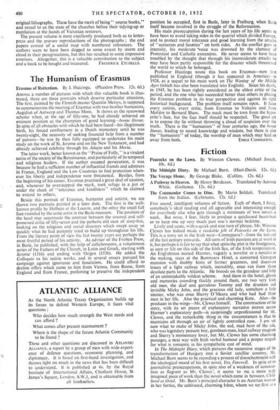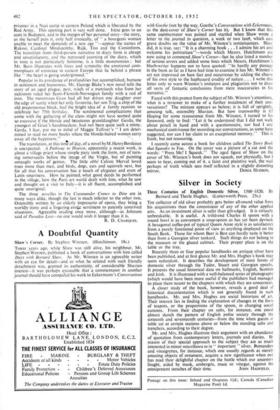Fiction
The Commander Comes to Dine. By Mario Soldati. Translated from the Italian. (Lehmann. 12s. 6d.) FIVE sound, intelligent volumes of fiction. Each of them, I fancy, somebody's ideal reading and all agreeable and interesting enough for everybody else who gets through a minimum of two novels a week. But none, I fear, likely to produce a quickened heart-beat or to keep one up very much past one's normal bedtime.
Lively and acute, with a quick and nice turn of phrase, Mr. Winston Clewes has indeed made a readable job of Peacocks on the Lawn. This is a story set in the Irish west—Connepiara?—from the tail-end of the last century onwards. All sorts of Irish passions are at work in it, but perhaps it is fair to say that what spins the plot is the foreignness, as seen or felt on this side of the Irish Sea, of the Irish temperament. An Englishman named Harmer, vaguely a novelist or a novelist in the making, stays at the Bunmeara Hotel, a converted Georgian mansion with shabby hints of former greatness, and discovers traces of a light railway which, incredibly, once ran from those desolate parts to the Atlantic. He broods on the grandeur and folly of an unmistakably wildcat scheme. And there in the hotel, ghosts and memories crowding thickly around them, are two very Irish old men, the deaf and garrulous Tommy and the drunken and invisible Micky John, and the gracious old lady, somehow a little sinister, who was once Sherry O'Meara and who had had three men in her life. Also the practical and charming Kate. Also—the producer in the wings—Mr. Clewes himself. The construction of the story, with its set pieces of explanatory narrative strewn across Harmer's exploratory path—is surprisingly unprofessional for Mr. Clewes, and the remarkable thing in the circumstances is that he maintains all through an air of lightly controlled ease. I am not sure what to make of Micky John, the sad, mad hero of the tale, who was legendary peasant boy, gombeen-man, local railway magnate and Sherry's momentary lover, but Mr. Clewes has some charming passages, a rieat way with fish verbal humour and a proper respect for what is romantic in his sympathetic cast of mind. In The Midnight Diary, which pictures the successive stages of the transformation of Hungary into a Soviet satellite country, Mr. Michael Burn seems to be recording a process of disenchantment with the ideological mood of his first novel, Yes, Farewell. In spite of its journalistic preoccupations, in spite also of a weakness of construc- tion as flagrant as Mr. Clewes', it seems to me a more truly imagined piece of work than the novel which came in between, Child- hood at Oriol. Mr. Burn's principal character is an Austrian woman in her forties, the cultivated, charming Irene, whom we see first as a prisoner in a Nazi camp in eastern Poland which is liberated by the Red Army. This opening part is very well done. Irene goes to an aunt in Budapest, and in the margin of her personal story—the story, as she herself puts it, only half ironically, of " a bourgeois woman unable to meet the demands of a new age "—appear the names of Rakosi, Cardinal Mindszenthy, Rajk, Tito and the Cominform. The transition from third-person narrative to diary form is abrupt and unsatisfactory, and the repressed yearning of the diary, which in tone is not particularly feminine, is a little monotonous ; but Mr. Burn illustrates with force and sympathy the emotional com- monplaces of existence in eastern Europe that lie behind a phrase like " the heart is going underground."
Popular in its avoidance of profundities but accomplished, humane in sentiment and humorous, Mr. George Blake's new novel tells the story of an aged plague, pest, witch of a matriarch who from her sickroom ruled her Scots-Flemish-Norwegian family with a rod of iron. The monstrous Gran had all but driven one daughter over the edge of sanity when her only favourite, her son Trig, a chip of the old preposterous block, had the bright idea of a family reunion to celebrate her 75th birthday. The sentimental complications that come with the gathering of the clans might not have seemed quite sp excessive if the blonde and beauteous granddaughter Gerda, the youngest of Gran's handmaidens, had not been quite such a ninny. Gerda, 1 fear, put me in mihd of Maggie Tulliver's " I am deter- mined to read no more books where the blonde-haired women carry away all the happiness."
The translation, at this time of day, of a novel by M.HenryBordeaux is unexpected. A Pathway to Heaven, apparently a recent work, is about a village priest whose simple piety took the form, not of turn- ing somersaults before the image of the Virgin, but of painting untaught works of genius. The little abbe Calixte Merval loved trees more than men, and birds, dogs, cats and squirrels next, but for all that his conversation has a' touch of elegance and even of Latin smartness. How he painted, what good deeds he performed in the village, how the Paris art world dealt with him, what he saw and thought on a visit to Italy—it is all fluent, accomplished and quite unoriginal.
The three novellas in The Commander Comes to Dine are in many ways alike, though the last is much inferior to the other two. Ostensibly written by an elderly impresario of opera, they bring a worldly irony and a lingering erotic sentiment to patently contrived situations. Agreeable reading once more, although—as Johnson said of Paradise Lost—no one would wish it longer than it is.
R. D. CHARQUES.



































 Previous page
Previous page